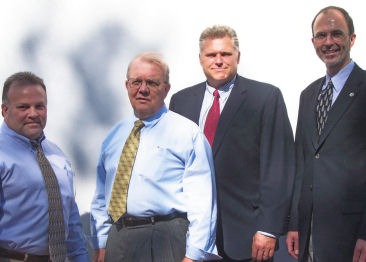March 2006 - The tangible return to employers by investing in the training and certification of their crane operators was attested to by representatives of industry and government at the Florida Crane Owners Council (FCOC)’s first-quarter 2006 meeting in January.
“Statistics show that a crane operator certified through the CCO program is a safer operator and has fewer accidents than operators who are not CCO-certified,” said Kevin Cunningham, President and CEO of Special Risk Services (SRS), Chicago, IL.

Picturesd at the Florida Crane Owners Council meeting in January are (l to r): Bill Smith, senior safety and health inspector, OSHA Directorate of Construction; Bruce Swanson, director of OSHA's directorate of construction; Kevin Cunningham, president and CEO, SRS Special Risk Services; and Graham Brent, NCCCO executive director
Working through Lloyd’s of London, Special Risk Services (SRS) provides specific line item premium credits for crane/contractor accounts that can validate their operators have successfully obtained CCO certification. Cunningham noted that SRS underwriters have the authority to apply up to a 10% rate credit for employers of CCO-certified crane operators, for each of three lines of insurance: Equipment Insurance, Riggers Liability Insurance, and General Liability Insurance.
Insured companies need to be able to supply copies of their operators’ CCO certification cards in order to be considered for the discount. Contractors with only a portion of their overall operators certified may qualify for a pro rata percentage credit on base premium rates, he said.
Cunningham also noted that his firm was working with federal OSHA to quantify this benefit through the sharing of accident data.
Commenting on OSHA’s ongoing efforts to revise the cranes and derricks standard, Bill Smith, Senior Safety & Health Inspector of OSHA’s Directorate of Construction stated that publication of a proposed rule was about a year away. At that time there would be plenty of time for public comment, following which a final rule would be prepared.
Noting that the Cranes & Derricks Advisory Committee (CDAC) had produced a “good piece of work” during the 12 months it had labored to revise the standard, which includes a requirement for crane operators to be certified, Smith exhorted FCOC members to make comments once the proposed standard was published. “Many people feel they only have to comment when they don’t like something,” he said. “But it’s just as important for you to comment if you are particularly in favor of some of the new provisions. That’s the only way OSHA is going to get balanced feedback.”
The Florida Crane Owners Council (FCOC) is a membership organization affiliated with the Associated Builders & Contractors (ABC). Its mission is to collectively address the issues and concerns of Florida-owned crane companies, and to develop and monitor laws, regulations and standards for the safe, efficient and profitable future of the industry.